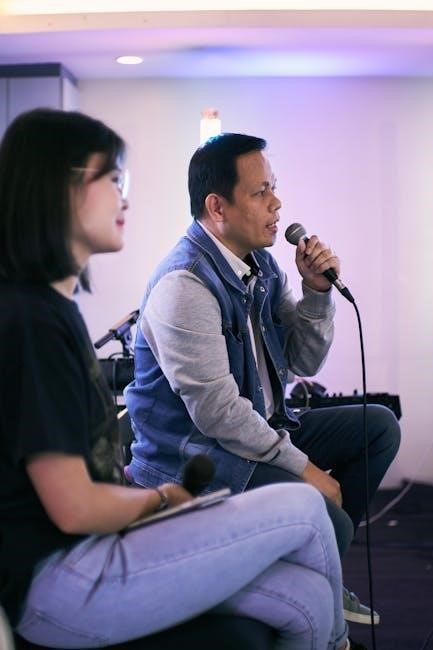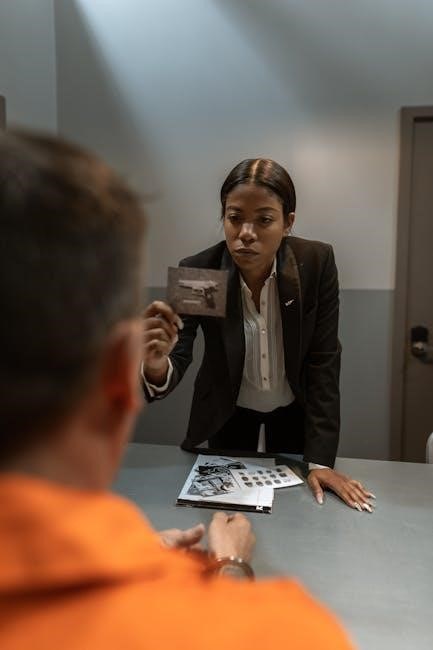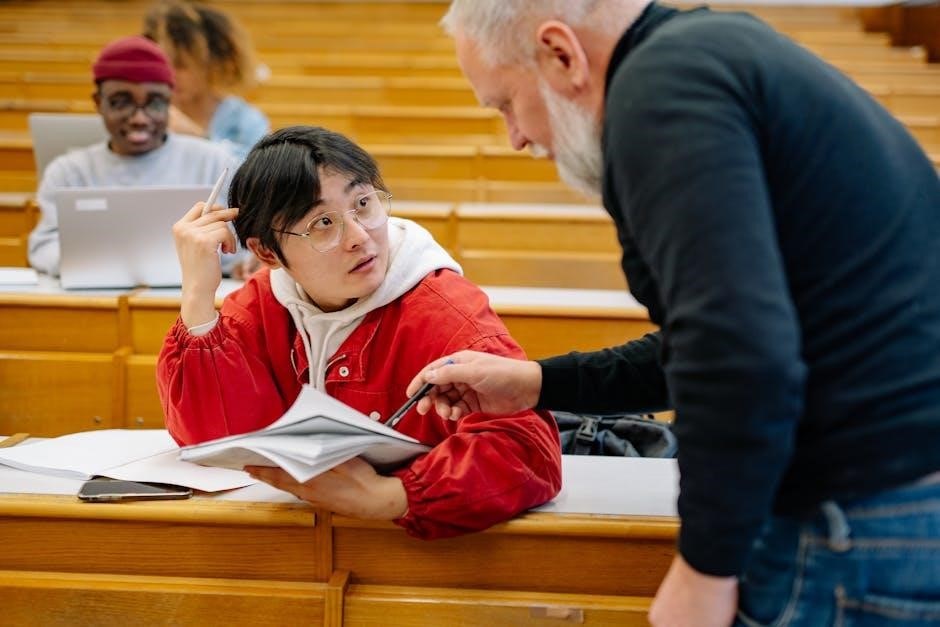Welcome to the ultimate guide for F1 visa interview preparation! This section provides a comprehensive overview of common questions, expert tips, and real-life examples to help you succeed. Downloading an F1 visa interview questions and answers PDF ensures you’re well-prepared, covering topics like program selection, financial planning, and post-graduation goals.
1.1 Overview of F1 Visa Interview Process
The F1 visa interview is a critical step in securing your student visa. It typically lasts 5-10 minutes, focusing on your academic plans, financial stability, and intent to return home. Be prepared to discuss your program, sponsors, and future goals. The I-20 form and proof of funds are essential. Downloading an F1 visa interview questions and answers PDF can help you anticipate common queries and ensure a smooth process. Proper preparation is key to demonstrating eligibility and sincerity, increasing your chances of approval.
1.2 Importance of Preparing for the Interview
Preparation is crucial for a successful F1 visa interview. Consular officers assess your credibility and intentions through your responses. A well-prepared candidate demonstrates clarity on academic goals, financial stability, and plans after graduation. Using an F1 visa interview questions and answers PDF helps you practice responses, ensuring confidence and accuracy. Proper preparation reduces the risk of denial and highlights your readiness for the opportunity.

Common F1 Visa Interview Questions
Common F1 visa questions cover background, program selection, financial plans, and post-graduation goals. An F1 visa interview questions and answers PDF provides a comprehensive list of these inquiries and model responses to help you prepare effectively for your interview.
2.1 Background and Application-Related Questions
Background questions include inquiries about your academic history and how you selected your program. Examples are, “How did you find out about this school?” or “How many schools did you apply to?” These questions assess your intentions and preparation. An F1 visa interview questions and answers PDF provides detailed responses to such queries, ensuring clarity and confidence during your interview.
2.2 Academic and Career Goals
Questions about your academic and career goals are common. Examples include, “Why did you choose this program?” or “How will this degree help your career?” Be prepared to explain how your studies align with your future aspirations. An F1 visa interview questions and answers PDF often includes tips on articulating your goals clearly and confidently, demonstrating your commitment to your education and professional growth.
2.3 Financial Aspects and Sponsorship
Questions about your financial situation are crucial. Be ready to provide proof of funding, explain your sponsorship, and discuss how you’ll cover living expenses. An F1 visa interview questions and answers PDF often includes examples of how to clearly present your financial plan, ensuring you meet visa requirements and demonstrate financial stability for your studies in the U.S.
2.4 Intent to Return Home After Studies
Proving intent to return home after studies is vital. Discuss ties to your home country, such as family, job offers, or future plans. An F1 visa interview questions and answers PDF often includes examples of strong responses, emphasizing your commitment to returning and how your studies align with future goals in your homeland.

Tips for Success in the F1 Visa Interview
Research the program, practice answers, and organize documents. Present clear academic and career goals, demonstrating strong ties to your home country to assure return intent after studies.
3.1 Researching the School and Program
Researching the school and program is crucial for a successful F1 visa interview. Understand the institution’s reputation, program curriculum, and faculty expertise. Be prepared to explain why the specific program aligns with your academic and career goals. Highlight unique opportunities like research labs, internships, or specialized courses. Demonstrating genuine interest shows commitment and seriousness about your studies.
3.2 Practicing Responses to Common Questions
Practicing responses to common F1 visa interview questions is essential for confidence and clarity. Review frequently asked questions about your background, academic goals, and financial plans. Use an F1 visa interview questions and answers PDF to anticipate topics and craft concise, honest answers. Mock interviews with friends or mentors can simulate real scenarios, helping you refine your delivery and tone.
3.3 Understanding the Role of the I-20 Form
The I-20 form is a critical document for your F1 visa application, confirming your eligibility as a non-immigrant student. It outlines your program details, tuition costs, and financial sponsorship. Ensure the I-20 is signed and matches the information in your application. Bringing it to the interview demonstrates preparedness and verifies your enrollment plans.

Real-Life Examples of F1 Interview Questions
Real-life F1 interview questions often focus on program selection, post-graduation plans, and financial stability. Examples include, “Why did you choose this program?” and “What are your plans after graduation?”
4.1 Questions About Program Selection
Questions about program selection often focus on why you chose a specific school or course. Be prepared to discuss the program’s reputation, curriculum, and faculty expertise. Explain how the program aligns with your academic and career goals. Examples include, “Why did you choose this program?” and “How does this program differ from others you considered?”
4.2 Questions About Post-Graduation Plans
Questions about post-graduation plans often focus on your intentions after completing your studies. Be ready to explain how your education will benefit your home country. Examples include, “What are your plans after graduation?” and “How will this degree help your career?” Emphasize your commitment to returning home and leveraging your skills for future opportunities.
4.3 Questions About English Proficiency
English proficiency questions assess your ability to succeed in an English-speaking academic environment. Common questions include, “How did you learn English?” or “How will you manage coursework in English?” Be prepared to discuss your language skills, test scores (e.g., TOEFL or IELTS), and how you plan to improve your proficiency. Confidence and clarity are key.

Documents Required for the Interview
Ensure you bring your passport, I-20 form, financial documents, admission letter, and sponsorship proof. Organize these documents neatly to demonstrate preparedness and facilitate a smooth process.
5.1 Essential Documents to Bring
For a successful F1 visa interview, bring your passport, I-20 form, SEVIS fee receipt, financial documents, admission letter, transcripts, test scores, and proof of sponsorship. Organize these documents in a folder for easy access. Ensure all financial statements are recent and reflect sufficient funds for tuition and living expenses.
5.2 How to Organize Your Documents
Arrange your documents in a logical order using folders or binders. Separate them into categories like financial, academic, and personal documents. Label each section clearly and ensure all papers are up-to-date. Place the most important documents, like your passport and I-20, at the front. This organized approach ensures quick access during the interview and makes a positive impression.

Understanding the I-20 and SEVIS
The I-20 is a critical document issued by your school, verifying eligibility for an F1 visa. SEVIS tracks international students’ status. Understanding both is essential.
6.1 What is the I-20 Form?
The I-20 is a Certificate of Eligibility for Nonimmigrant Student Status. It confirms acceptance to a SEVP-approved school and verifies financial resources. Essential for F1 visa application, it outlines program details, enrollment dates, and sponsor information. Bringing this form to your interview is mandatory, as it validates your student status and intent to study in the U.S.
6.2 Importance of SEVIS Fee Payment
Paying the SEVIS fee is mandatory for F1 visa applicants. It activates your SEVIS record, enabling the issuance of the I-20 form. The fee supports the Student and Exchange Visitor Information System, which tracks international students. Failure to pay can result in visa denial. Ensure payment confirmation is brought to your interview for verification purposes.

Visa Interview Preparation Resources
Download comprehensive guides and PDF materials offering detailed F1 visa interview questions and answers. Explore online communities and forums for real-life examples and applicant experiences to enhance your preparation.
7.1 Recommended Guides and PDF Materials
Access comprehensive guides and PDF resources that detail common F1 visa interview questions and answers. These materials often include tips, real-life questions, and sample responses to help you prepare effectively. Downloading these resources ensures you are well-informed about what to expect and how to present your case confidently during the interview process.
7.2 Online Communities and Forums
Engage with online communities like Reddit’s F1 Visa forum and specialized Facebook groups. These platforms offer valuable insights, shared experiences, and practical advice from past applicants. Participants often discuss common interview questions, tips for success, and real-life scenarios, providing a supportive environment to refine your preparation and build confidence.

Case Studies of Successful Interviews
Explore real-life examples of successful F1 interviews, showcasing how applicants effectively answered questions about their academic goals, financial plans, and intent to return home. Gain insights from their experiences and strategies to boost your confidence and preparation.
8.1 Examples of Strong Answers
Explore real-life examples of strong answers from successful F1 applicants. Learn how they clearly articulated their academic goals, demonstrated financial stability, and expressed their intent to return home. These examples provide valuable insights into effective response structuring, helping you craft confident and compelling answers to common questions, enhancing your interview performance and approval chances.
8.2 Lessons Learned from Past Applicants
Applicants highlight the importance of honesty and providing detailed, concise answers. Demonstrating clear academic and career plans, along with proof of financial stability, significantly improves approval chances. Proper documentation and thorough preparation are essential. Practicing responses and understanding program specifics also help applicants present themselves confidently, showcasing their commitment to returning home after studies.
Technical Aspects of the F1 Visa
Understanding F1 visa rules, such as maintaining full-time student status and work restrictions, is crucial. The F1 visa differs from the M1 visa, which is for vocational studies.
9.1 Understanding Visa Types (F1 vs. M1)
The F1 visa is for academic studies, while the M1 visa is for vocational or technical training. F1 students can work on-campus up to 20 hours/week, whereas M1 students cannot. F1 requires a broader curriculum, while M1 focuses on specific skills. Understanding these differences is crucial for selecting the correct visa type and complying with regulations during your stay in the U.S.
9.2 Rules and Regulations for F1 Students
F1 students must maintain full-time enrollment, with most programs requiring at least 12 credits per semester. Work is restricted to on-campus jobs, up to 20 hours per week during the academic term. Off-campus employment requires authorization. Students must also keep their SEVIS record updated and comply with visa renewal processes. Failure to adhere to these rules may result in visa revocation.

Frequently Asked Questions (FAQs)
FAQs address common concerns about the F1 visa process, such as visa denials, required documents, and post-interview procedures. They provide clarity and reassurance to applicants.
10.1 Addressing Concerns About Visa Denials
Visa denials often stem from insufficient proof of financial stability, unclear academic plans, or weak ties to one’s home country. To avoid denial, ensure all documents are thorough, practice articulating your goals, and demonstrate strong intent to return home. Consulting an F1 visa interview questions and answers PDF can also help address these concerns effectively.
10.2 Clarifying Common Misconceptions
Many applicants believe the F1 visa process is straightforward, but it requires thorough preparation. Contrary to popular belief, obtaining an F1 visa isn’t guaranteed and isn’t solely based on academic merit. Misconceptions about work opportunities, post-graduation options, and visa restrictions are common. Understanding the realities, such as limited employment options and the need to maintain student status, is crucial for a successful application.

Post-Interview Procedures
After the interview, wait for a decision. If approved, collect your passport with the F1 visa. Verify details for accuracy. Understand the I-20 form’s importance and next steps, like travel arrangements and enrollment.
11.1 What to Expect After the Interview
After the F1 visa interview, the officer will inform you of the decision. If approved, your passport will be stamped, and you’ll receive your visa. Processing times vary, but typically, it’s within a few days. If denied, you’ll receive a reason and guidance on next steps. Ensure all documents are correct before leaving the consulate.
11.2 Next Steps After Visa Approval
After F1 visa approval, collect your passport with the visa stamp. Review the visa details for accuracy. Complete SEVIS registration and pay the fee. Prepare for travel by ensuring all documents, like your I-20 and admission letters, are in order. Contact your school for orientation details and housing arrangements. Finalize travel plans and gather essential items for your studies in the U.S.
Concluding your F1 visa preparation, remember to stay calm and confident. Practice your answers, organize your documents, and review the I-20 form. Stay positive and focused.
12.1 Summarizing Key Points
Preparing for your F1 visa interview involves understanding common questions, organizing documents, and practicing responses. Focus on program selection, financial planning, and post-graduation goals. Ensure your I-20 form is accurate and SEVIS fee paid. Stay calm, be honest, and highlight your genuine intent to study. Downloading an F1 visa interview questions and answers PDF can provide valuable insights and examples to boost your confidence.
12.2 Encouragement and Motivation
Stay positive and focused! Preparing for your F1 visa interview is a significant step toward achieving your educational goals. Remember, proper preparation boosts confidence and increases your chances of success. Focus on researching your program, practicing responses, and organizing documents. Believe in yourself and the opportunities ahead. Stay motivated, and you’ll navigate the process smoothly!
